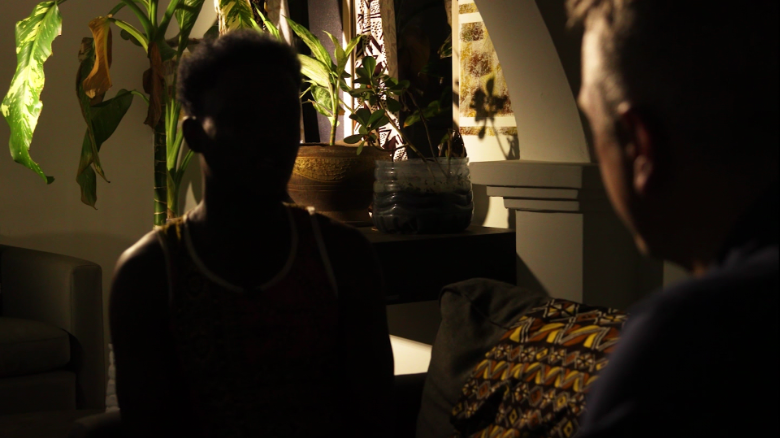How a US group with links to the far-right may have influenced a crackdown on Ghana’s LGBTQ community

Tucked away in a neighborhood of Accra, off Aflao Road, a group of Ghanaian gay activists use the house to gather in secret and provide shelter to LGBTQ people in need. Sitting on the corner of a couch in the gloomy interior, Joe holds a small clutch in both hands and speaks with a quiet defiance. “I can’t change the way I am. I can’t change who I am,” he says. “This is natural, and it is how I feel. But we are dead. We are all now dead. We can’t go out again and we can’t mingle with our friends again.” It wasn’t supposed to be like this in Ghana. For years, Ghanaian LGBTQ activists felt they had made progress. They witnessed a quiet tolerance, especially in larger cities, and believed that their rights would continue to evolve. But within weeks, Ghana’s parliament is set to debate a draft bill — framed in the guise of “family values” — which seeks to introduce some of the harshest anti-LGBTQ laws on the African continent. The prospect of it passing is pushing the country’s LGBTQ community into the shadows. LGBTQ Ghanaians have been left asking how things got so bad, so quickly, and Western diplomats say they have been caught by surprise. But what one Ghanaian activist calls a “homophobe’s dream bill” has deep roots in Ghana’s religious community. It also found key inspiration from a US ultra-conservative group with Russian ties. Humiliated on camera Joe’s path to the safe house began in his hometown, several hours drive from the capital. CNN agreed to identify him only by his assumed first name, because he fears for his safety.One evening several months ago, Joe says he was accosted on the street by a group of men who accused him of approaching one of their male relatives. “I was shaking when they took me to that room and they took out their cameras. I was shaking and I was crying,” he told CNN. “Those who are promoting gays and lesbians are not going to have children at all, and within a short time nobody should be surprised that Muslims will become a majority in this country and declare it an Islamic state,” Archbishop Philip Naameh, the president of the Ghana Catholic Bishops Conference, told CNN. He welcomes the support of WCF.But some activists believe a crackdown on LGBTQ rights was waiting to happen with or without a nudge from US conservatives, because of growing discontent within the religious community in Ghana. In a massive online prayer rally in March entitled: “Homosexuality: a detestable sin to God,” pastors at the millions-strong Pentecostal Church said it was a matter of “national security” to pass a law; they continue to push members of parliament to follow through with their plans. The Pentecostal Church’s leadership repeatedly refused CNN’s requests for an interview. The damage is already done Members of parliament and activists say the draft bill will be debated and likely voted on after Ghana’s parliament reopens in late October. Based on CNN’s reporting, it appears to have strong support — even among more moderate MPs. The bill may end up being watered down in the amendment process. It will also need to be signed by President Nana Akufo-Addo, who is likely to face harsh condemnation from Western donors if it comes into law. The bill places Western nations in a difficult position. Already heavily criticized for supporting the opening of the LGBTQ center earlier this year, the European Union and Australian missions would not speak to CNN on the record. The US did not have a representative at the opening, but one of the Biden administration’s first acts was to formally task its agencies with combating anti-LGBTQ legislation globally. A State Department spokesperson told CNN the US government was concerned with the increasing rhetoric and actions that threaten the LGBTQ community in Ghana. “We are monitoring the situation closely,” the State Department statement said. “We urge national leaders in Ghana to uphold constitutional protections and to adhere to Ghana’s international human rights obligations and commitments for all individuals.”
But for many activists, the damage is already done.In late May, more than 20 participants in an LGBTQ paralegal training session organized by One Love Sisters, Ghana and Key Watch Ghana were arrested for “unlawful assembly” in the country’s southeastern Volta region. One of those present, a 21-year-old intersex woman, who has asked CNN to identify her by the pseudonym Edem Amavor because she fears for her safety, told CNN she was physically and sexually assaulted by police in a horrifying ordeal.Intersex people have natural variations in reproductive anatomy, chromosome patterns or other traits that may not align with typical binary definitions of female or male.”I was taken to a male cell,” she recalls. “The officers told the men in the cell to rape me since I insisted I was a female.” Volta regional police spokesman Sgt. Prince Dogbatse told CNN that: “No such reports have come to the attention of the Command,” but that they would investigate the matter. Another of those detained was Eddy Oppong, also using a pseudonym because of safety concerns. He was among those detained and released after 22 days, after charges against the paralegal group were dropped in early August.
“People are scared,” says Danny Bediako. “People are feeling insecure to even go into public spaces and hold meetings for their organizations. Some people have stopped their support entirely.” He says he is now trying to hold support groups online. Bediako says LGBTQ activists have submitted memoranda to parliament to lessen the blow from the proposed new law, and they are trying to speak to MPs to encourage them to weaken the bill’s provisions, but he fears few politicians will be brave enough to engage with them in the current climate — even if lives are at stake. “The people who suspect us are waiting for the bill to be passed so they can beat us up and hand us over to the police,” he said. He believes that the limited space that Ghanaians from the LGBTQ community had to be themselves may soon vanish and that the precipitous drop in rights seen in recent months could become a permanent feature. Joe, the gay Ghanaian who was beaten and thrown out of his home, spent just a few days at the safe house in Accra before moving on. He says he wishes he hadn’t been born in Ghana. And he has a message for the MPs and religious leaders fronting the bill: “We are all human beings. Their sons and their daughters can be like me. They can face the same thing, like the way those guys did to me.” “I want to ask: ‘If their daughters and their sons have been through this — will they allow the law to take them to jail?’ My answer to them is they should put a stop to it.” David McKenzie reported from Accra, Ghana, while Nimi Princewill reported from Abuja, Nigeria. Graphics by Byron Manley and Peter Roberston. Photo illustration by Alberto Mier.




